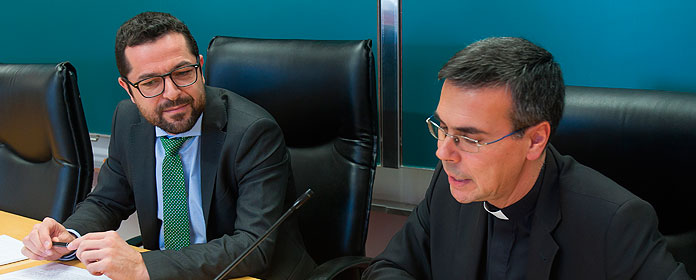José Manuel Caamaño: "Researchers have the challenge to humanise science".
The director of the Chair Francisco José Ayala of Science, Technology and Religion of the Universidad Pontificia Comillas ICAI-ICADE warns of the risk of the 'technocratic paradigm'.

"Researchers have the challenge to humanize science, so that it does not become a slave to power, and so that scientists do not shut themselves up in the solitude of their prodigious scientific knowledge ." This was stated at the University of Navarra by José Manuel Caamaño, director of the Chair Francisco José Ayala of Science, Technology and Religion of the Universidad Pontificia Comillas ICAI-ICADE. His statements were made in the context of the seminar 'The Technocratic Paradigm', organized by the group 'Science, Reason and Faith' (CRYF) of the academic center.
In his remarks, Caamaño stressed the importance of thinking about the University's mission statement and reinforced this idea by recalling the Spanish philosopher José Ortega y Gasset's speech : "If science brought order to life, now it will also be necessary to bring order to science: to organize it, since it is not possible to regulate it. To make possible its healthy durability, to endow it with a form compatible with the human life that made it and for which it was made".
He also emphasized that researchers must ask themselves in whose favor and for what is the knowledge, beyond what the criteria of the National Agency for Assessment of Quality and Accreditation ask of them: "Universities, companies and researchers alike must discern what they are opting for and what they are giving up in their academic work".
"Science, technology and technology must be at the service of life."The expert affirmed that the sciences, in all their expressions, have before them the challenge search for truth and the best service to society: "We need a sapiential horizon for science, of which John Paul II spoke, because perhaps the greatest risk of any scientist, and of any technician, is to be instrumentalized at the service of power. Science, technique and technology have to be at the service of life, at the service of the human, integral and supportive development ". He also bet on the multidisciplinarity in the search for truth, because "the human being, although we study him fragmented, can never be adequately understood in a fragmented way".
During the seminar, José Manuel Caamaño also highlighted some of the criticisms against the technocratic paradigm that Pope Francis has highlighted in his encyclical Laudato si' and of whose risks Paul VI had already warned in Populorum Progressio of 1967: "The Pope denounces neither science, nor technology, nor technique, but the technocratic paradigm, which affects the way of organizing society and addressing its problems, as well as the way of understanding human life and our actions at their deepest roots".
